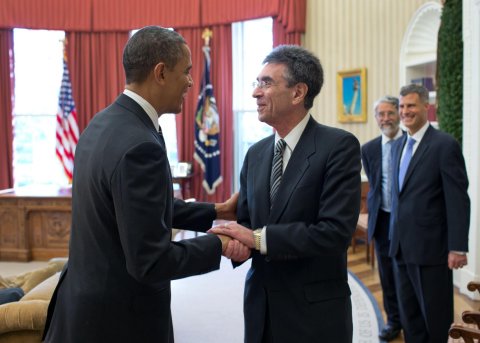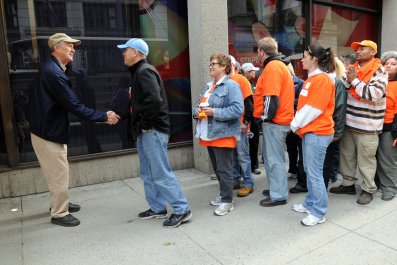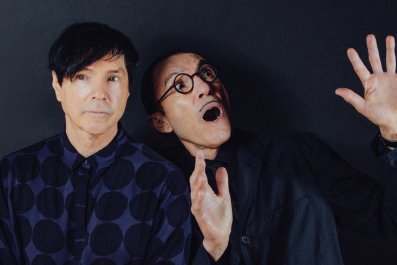Regrets—I've had a few. I wish I could say they're too few to mention, but that wouldn't be true. If you have ambition, you have regrets. It comes with the territory.
I recently made the mistake of writing a memoir recounting adventures from my life and career as a physician and scientist. Naturally, the writing process led me to also meditate on my many regrets, which unfortunately I didn't get a chance to detail in the book because my publisher wanted to "keep things positive."
One of my biggest regrets is that I never mastered a musical instrument. I played percussion as a student and also took piano lessons, but didn't stick with it. I was in such a hurry as a young man to achieve my dream of becoming a doctor that other ambitions, such as my musical aspirations, fell by the wayside.
I constantly have Walter Mitty-esque fantasies of being an elite musician. Sometimes I even act these fantasies out. A few years ago, I took a visiting professor to an upscale restaurant on the Duke Medical Center campus in North Carolina. We had to wait a few minutes for our table, so I sat down on a bench in front of a piano. Suddenly, the piano sprang to life and began playing itself. Without missing a beat, I put my fingers on the keys and began swaying along as if I were playing. Many of the diners looked over at me, nodding appreciatively in the belief that I was spontaneously regaling them with some light dining music.
After a few minutes, I sensed the piece was building to a climactic crescendo, so I threw my hands up with a flourish just as the song ended. The dining room erupted in applause, and I stood to take a bow. As I basked in the adulation and began heading to my table, the piano jolted to life again and began playing another song on its own, causing the entire room to burst into laughter. I'm not sure which I enjoyed more: the applause for my musical "performance" or the huge laugh I got afterwards when everyone realized that I was a complete phony.

Yet whenever people ask me what career I would have chosen if I hadn't become a doctor and scientist, I always say that I would've been a stand-up comic. As a college student in New York City in the 1960s, I regularly hit the clubs in Greenwich Village to catch performances by edgy comedians like Mort Sahl and Lenny Bruce.
Regrettably, I lack the level of wildfire talent to make it as a professional stand-up, but that hasn't stopped me from cracking jokes at every opportunity in my daily life. In fact, a core part of my philosophy of mentoring is that I believe humor and playfulness are great prods to creativity: the more people are laughing, the more creative they become. For this reason, I am constantly joking around in meetings with the trainees in my research lab at Duke, with the humorous tone hopefully setting the stage for inspiration.
My inner stand-up comic comes out sometimes when I'm invited to give presentations to scientific audiences. Some years ago, I was asked to deliver an after-dinner speech to all the board members and current investigators of the Howard Hughes Medical Institute (HHMI), which has funded my lab's research for many decades. These days, HHMI is a well-run and buttoned-down organization, but my after-dinner talk focused on the wild early days of HHMI back in the 1970s.
The audience ate up my over-the-top stories, with every single joke slaying. Legendary neuroscientist Eric Kandel was laughing so hard that tears were streaming down his face. Forget about winning the Nobel Prize in Chemistry: the high point of my career came when my comedy routine killed at the HHMI dinner.

I love giving talks to student groups, and students are rarely shy in asking about my regrets. A common question I get is, "Do you regret that it took so long for you to win a Nobel Prize?" Most of the work for which I won the Prize was done decades ago, but I didn't get the call from Stockholm until 2012. I tell the students that in some respects I do regret the long wait, especially because it meant that neither of my parents was alive to see me receive the Prize.
When I was a young man, I won many awards in school and in my early professional career, and invariably my mother would say, "Well that's nice, Bobby, but it's not the Nobel Prize." For my mom, it was apparently either Nobel or bust. Thus, when I ultimately won a Nobel, it would have been very satisfying to take my mom to Stockholm to show her that I had finally made good. I never got the chance, alas, but when I did attend the Nobel ceremony I remember having elaborate internal fantasies about my mother being there to share it with me, and somehow these imagined discussions with my mother were intensely satisfying.
A common theme of all my regrets is that fantasy has been an important coping mechanism for me. I'm never going to be a great musician or stand-up comic, and I certainly can't bring my parents back to have healing conversations, but I can use imagination as a sort of therapy for dealing with these regrets. Given this insight, I look forward in the coming years to addressing other regrets, such as my regret that I never learned a foreign language.
I've come to realize that what I really want is to simply sound like I can speak another language. My son Noah, a former professional actor, has suggested that I hire an accent coach. Why take years to learn a language if I can deploy an arsenal of debonair accents with just a few weeks of training? One day soon you'll hear me engaging all the international trainees in my research laboratory in discussions where I match their melodious accents, shifting my accent in a Zelig-like manner as I move from person to person, effortlessly creating the impression that I'm a cosmopolitan polyglot.
I still won't be multilingual, but the temporary fantasy that I am may be enough.
Dr. Robert Lefkowitz is a professor at Duke University and a co-author of "A Funny Thing Happened on the Way to Stockholm: The Adrenaline-Fueled Adventures of an Accidental Scientist". The book's co-author, Randy Hall, also contributed to this piece.
All views expressed in this article are the author's own.








